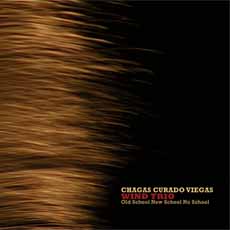
João Pedro Viegas - soprano & bass clarinets
Paulo Chagas - flutes, oboe & sopranino clarinet
Paulo Curado - flute, soprano & alto saxophones
cs224
It is always a very difficult chore for me to write about musical creation… Extreme responsibility and potential incoherence when, for different reasons and at different times, I subscribed to the notion that music should not need written “justification”, that it should be a meaningful whole entity by itself, without any need for literary or illustrative redundancies or, rather frequently, mediocre “explanations”… Mostly when tentatively put together by someone whose basic means of expression are not the written word. I do not mean to imply with this introduction, for some form of pathetic justification to a potentially wrong analysis of this musical creation. Only my forwarded worries at such an unusual (for me) complicated task… I’ve always been fascinated by woodwinds, as well as by almost any of the wood instrument lutherie – because of all its richness, its acoustic vibration, its wooden grain… Somehow less important for me, the metal construction of brass or metal “woodwinds” — maybe just because wrongly being exposed to so many different “jazz” and related idioms’ instrumentalists, where so few manage to go beyond known and regular paths of reinterpretations within previously defined languages, or exhaustive repetition of forms and its conjugations. None of this comes to mind when, with this new trio recordings, we are still capable of finding such a rich and diverse interaction of materials, textures and languages that pushes us, inevitably, to another kind of analysis and perception, a far distance from any expected preferences and previously forwarded aesthetic doubts. The intricate compositional movement — as we may understand and define these pieces as continuously evolving mutations —, the acute physical movement of sound, of individual ideas and concepts, that finally mingle into a beautiful coherent whole of togetherness. Where the subtlest change can define an almost extreme and unpredictable reaction. Where the tiniest particle of an action may create an autonomous body of textures, directions and totally different sequences. Another kind of “chamber music”, with expressive as well as intimate proximities. Which pile together, fight each other, interact, construct unexpected dialogs, immediately followed by perfectly structured and “harmonically correct “ensembles. Where we find “treacherous” idiomatic melodic phrases, surprisingly in extreme contrast with the extensive techniques and corresponding sound parasites of the other instruments in the background (if there is such a notion here…), building an adventurous and evolving structure. When we listen to a “fake camerata” we will be — almost against our best conscious wishes… — pushed into a cinematic or a diversely frenetic operatic/choreographic sequence, till we crash, heads on, with all this unnecessary nonsense of our easy and superficial tradition for “building stories”, instead of just staying with the fundamental absurdity of this perverse and delirious humor.
Here we can find extreme instrumental virtuosity that perfectly knows how to avoid its common and usual minefields, through a continuous questioning of forms and processes. With this excellent trio’s different themes, we are always faced with the transversal perfect mix of technical ability and aesthetic research, where the so called improvisation is just a process as any other. A process where there is an ongoing mutation of elements, in such surprising and enriching changes that they will tear down common expectations and dilute preconceived notions… Our usual need for “safe” references, for more or less literary or illustrative symbolisms, will be fundamentally shaken and perverted with this music. Our usual consensual approach will become a far off and vain strangeness, because of the continuous adventure in being surprised by such a creative piece of art. We are charmed! Happily so…
Carlos “Zingaro”
Lisboa, July 2012